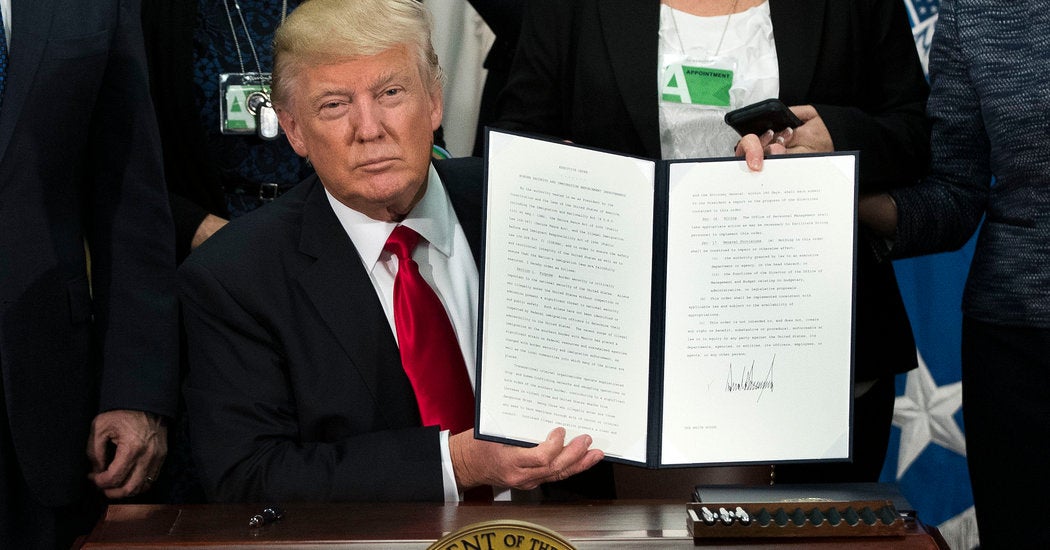Decoding Trump's Aggressive Stance On European Trade

Table of Contents
The "America First" Doctrine and its Impact on EU-US Trade
The core tenet of Trump's "America First" policy prioritized domestic industries over international trade agreements. This protectionist approach fundamentally reshaped US trade relationships, placing a strong emphasis on bilateral deals rather than multilateral agreements. This meant a rejection of global trade organizations like the World Trade Organization (WTO), a body Trump often criticized for its perceived unfairness to the US. A central focus was reducing the US trade deficit, which Trump viewed as a sign of American weakness.
- Emphasis on bilateral deals over multilateral agreements: Trump's administration favored negotiating individual trade agreements with countries, believing this approach offered greater leverage and control than participation in larger, multi-national organizations.
- Rejection of global trade organizations like the WTO: The WTO's dispute settlement mechanisms and rules were frequently criticized by Trump, leading to decreased US engagement and undermining the institution's authority.
- Focus on reducing the US trade deficit: This goal drove many of Trump's protectionist policies, including the imposition of tariffs on imported goods, aiming to boost domestic production and reduce reliance on foreign imports.
This doctrine manifested in concrete actions against the EU. A prime example is the imposition of Section 232 tariffs on steel and aluminum imports from the EU, justified on national security grounds. These protectionist policies, implemented under the guise of national security, significantly impacted bilateral trade relations and triggered retaliatory measures from the EU. The use of bilateral trade agreements became a defining feature of Trump's trade strategy, alongside a clear emphasis on reducing the trade deficit through protectionist policies.
Key Disputes and Their Economic Ramifications
The Trump administration engaged in several major trade disputes with the EU, significantly impacting transatlantic relations and global trade.
- The Airbus-Boeing dispute and retaliatory tariffs: This long-running dispute between the two aircraft manufacturers led to the imposition of retaliatory tariffs on both sides, escalating tensions and disrupting the aerospace industry. The resulting tariffs became a symbol of the escalating trade war.
- Disputes over agricultural products (e.g., soybeans, cheese): Tariffs on agricultural products, like soybeans and cheese, caused significant economic hardship for farmers and producers on both sides of the Atlantic, highlighting the far-reaching effects of the economic sanctions employed.
- The impact of tariffs on businesses and consumers on both sides of the Atlantic: The imposition of tariffs led to increased prices for consumers, reduced competitiveness for businesses, and job losses in industries affected by the trade disputes. The resulting retaliatory measures further exacerbated the negative economic impacts.
The economic consequences of these disputes were substantial. Studies showed significant reductions in trade volume between the US and EU, job losses in affected industries, and increased prices for consumers. The overall economic impact of this trade war underscored the significant costs of protectionist measures.
The Role of National Security in Trump's Trade Strategy
Trump frequently invoked national security concerns to justify his trade actions against Europe. This strategy allowed him to bypass traditional trade dispute mechanisms and impose tariffs without facing the usual WTO scrutiny.
- Arguments about protecting critical industries: Trump argued that certain industries, such as steel and aluminum, were vital to national security and needed protection from foreign competition.
- Concerns about intellectual property theft: Intellectual property theft was frequently cited as a national security concern, used to justify trade actions against countries accused of unfair practices.
- The use of national security as a justification for protectionist measures: The invocation of national security allowed the administration to sidestep established trade rules and impose protectionist measures without facing the same level of international scrutiny.
The validity of these claims was frequently debated, raising concerns about the potential misuse of national security as a pretext for imposing trade barriers and undermining the rules-based international trading system governed by WTO rules.
Long-Term Consequences and the Biden Administration's Response
Trump's aggressive trade stance left a lasting impact on EU-US relations.
- Damage to transatlantic trust and cooperation: The trade disputes eroded trust and cooperation between the US and EU, creating uncertainty and hindering collaboration on other issues.
- Increased uncertainty in the global trading system: Trump's actions contributed to increased uncertainty in the global trading system, making it more difficult for businesses to plan and invest.
- Shifting global power dynamics: The trade disputes contributed to shifting global power dynamics, as other countries sought to fill the void left by decreasing US engagement in multilateral trade organizations.
The Biden administration has adopted a significantly different approach to trade with Europe, prioritizing repairing the damaged relationship. This involved a shift away from Trump's unilateral actions and a renewed focus on multilateral cooperation and engagement with international organizations. The contrast between the two administrations' trade policy highlights the considerable impact of Trump's approach on transatlantic relations. The Biden administration’s emphasis on trade policy reform signals a departure from the aggressive tactics of the previous administration and a commitment to repairing damaged trade relations.
Conclusion
Trump's "America First" approach significantly disrupted EU-US trade relations through aggressive tariffs and disputes, often justified on national security grounds. These actions had significant economic consequences and damaged transatlantic trust. Understanding Trump's aggressive stance on European trade is crucial to comprehending the current state of transatlantic relations and the challenges facing global trade. Further research into Trump's European trade policy, its impact on specific industries, and the evolving strategies of the Biden administration is essential for navigating the complexities of the international trade landscape.

Featured Posts
-
 4 Gol Birden Soerloth La Liga Yi Salladi
May 25, 2025
4 Gol Birden Soerloth La Liga Yi Salladi
May 25, 2025 -
 A Practical Guide To Escaping To The Country
May 25, 2025
A Practical Guide To Escaping To The Country
May 25, 2025 -
 Southern Tourist Destination Responds To Criticism Following Shooting
May 25, 2025
Southern Tourist Destination Responds To Criticism Following Shooting
May 25, 2025 -
 Trumps Muscle Flexing The Republican Dealmaker
May 25, 2025
Trumps Muscle Flexing The Republican Dealmaker
May 25, 2025 -
 Trump Tariffs And Apple Assessing The Risks To Buffetts Portfolio
May 25, 2025
Trump Tariffs And Apple Assessing The Risks To Buffetts Portfolio
May 25, 2025
Latest Posts
-
 Euroleague I Monako Nikaei To Parisi Kai I Vathmologia Allazei
May 25, 2025
Euroleague I Monako Nikaei To Parisi Kai I Vathmologia Allazei
May 25, 2025 -
 Koji Grad Ima Najvise Penzionera Milionera
May 25, 2025
Koji Grad Ima Najvise Penzionera Milionera
May 25, 2025 -
 Alberto De Monaco Sus Mellizos Reciben La Primera Comunion
May 25, 2025
Alberto De Monaco Sus Mellizos Reciben La Primera Comunion
May 25, 2025 -
 As Monaco La Composition De L Equipe Contre Nice
May 25, 2025
As Monaco La Composition De L Equipe Contre Nice
May 25, 2025 -
 Najvise Penzionera Milionera Zivi U Ovome Gradu
May 25, 2025
Najvise Penzionera Milionera Zivi U Ovome Gradu
May 25, 2025
